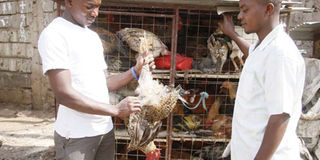Diary of a Poultry Farmer: Chicken in every backyard is what we need, not bad laws

Chicken trader Steve Kyalo, sells chicken at his stall at the Langa'ta Shopping Centre. Instead of imposing sanctions on urban poultry farmers, the county government should place strong emphasis on proper waste management to control the risk of diseases spreading, odour and flies. PHOTO | MARTIN MUKANGU | NATION MEDIA GROUP
What you need to know:
- One of the things the Bill suggests is that one must have written permission to keep more than 30 birds, and it further proposes a hefty fine of Sh100,000 and a jail term of not more than 24 months if this is flouted.
- When I want to know the harm or good that any new government might do to me, I first listen to its legislative agenda.
- The sector, however, needs to be nurtured, not to be stifled with needless regulations.
- Interest in backyard urban poultry farming is an international phenomenon whose benefits include human to animal bonding and production of eggs and meat.
Some two weeks ago, Nakuru County announced plans to restrict the rearing of chickens as contained in their Urban Agricultural Promotion and Regulation Bill.
One of the things the Bill suggests is that one must have written permission to keep more than 30 birds, and it further proposes a hefty fine of Sh100,000 and a jail term of not more than 24 months if this is flouted.
Now, in my day job, I often talk to decision makers and technocrats about the dos and don’ts of making public policy and one thing I always emphasise is that, “Common sense, instinct, emotion, fear or hearsay are poor basis for influencing policy decisions.”
You see, good policies should be based on facts, or what we call scientific evidence of what works, what doesn’t and why.
I will get into specifics of what I think about this Bill, but before that, let me share my experiences when I sought a licence to rear poultry in Nairobi.
You see, I had heard conflicting information about whether one requires to be licensed to rear poultry in the city or not.
So about a year ago, I visited the Nairobi County offices. The place was swarming with human activity as I ambled towards two men sitting behind a decrepit desk.
They seemed unperturbed by the filthy smell emanating from the adjacent toilets. I tried to build some camaraderie with the usual salutations, which were instead greeted with a stone face.
“Sema ile kitu imekuleta hapa, usiharibu wakati na salamu?” (Just state your case and stop wasting our precious time with greetings), one said.
DISEASE PREVENTION AND FARM BIOSECURITY
They then referred me to the Customer Care Section. The lady at the desk was more courteous although she wasn’t sure where poultry licences are issued.
As an afterthought, she referred me the Environment Department on the sixth floor where I met another lady who advised me to “just proceed with my project”. I was relieved.
When I want to know the harm or good that any new government might do to me, I first listen to its legislative agenda.
The majority of urban dwellers purchase their meat, eggs and milk mainly from the supermarkets and shops, meaning that any regulatory framework should focus on filling information and skills gap in disease prevention and farm biosecurity as opposed to imposing unnecessary sanctions.
Unfortunately, in most cases, governments tend to respond to problems by creating sanctions and imposing hefty penalties against offenders. What this does is to stifle innovation and the entrepreneurship spirit.
Now, don’t get me wrong. I am not against regulating urban farming. For a fact, this is one industry that has been operating in a legal grey zone for years.
The sector, however, needs to be nurtured, not to be stifled with needless regulations.
According to Food and Agriculture Organisation, agriculture contributes to about 30 per cent of our Gross Domestic Product, which means it is a crucial industry.
Another thing is that the sector offers the best opportunity for Africans to realise economic development and tackle poverty, youth unemployment, food insecurity, hunger and malnutrition.
PROPER WASTE MANAGEMENT
Interest in backyard urban poultry farming is an international phenomenon whose benefits include human to animal bonding and production of eggs and meat.
Of course there are concerns related to public health and community well-being, including spread of diseases, waste management, poultry pests and predators, noise and bad odour.
However, research undertaken by the University of Kentucky suggests that there is no scientific evidence to support these negative effects and the regulatory approach to raising backyard chicken in urban areas shouldn’t be any different from raising cats and dogs.
Did you know that when backyard chicken is fed on household waste, or when chicken manure is handled properly, it can be a good source of organic fertiliser, reducing the need for commercial fertilisers?
If you ask me, instead of imposing sanctions on urban poultry farmers, what the county government should do is to place strong emphasis on proper waste management to control the risk of diseases spreading, odour and flies.
Nakuru, for all that matters, is the breadbasket of Kenya and with the right incentives accorded to entrepreneurs, chicken manure can be put to very good use (Seeds of Gold April 23, 2016).
Someone may say that poultry keeping needs to be regulated because crowing of roosters can be a source of noise pollution.
Good thinking, but hold your horses. If I was the person coming up with the Bill, I would first regulate the noise from bars playing loud music in residential areas until the wee hours of the morning before complaining about roosters.





